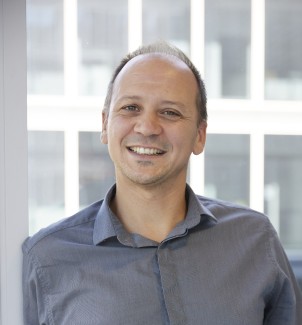
Biography
Eric Burguière is a neurophysiologist by training, specializing in behavioural studies, extracellular neural recordings, and neuromodulation (opto/chemo-genetics) in rodent models. He obtained his doctorate (neurosciences/cognitive sciences) in 2007 after a thesis conducted at the Collège de France in the laboratory of Pr. Alain Berthoz, followed by a 5-year postdoctoral period at the Massachusetts Institute of Technology in Pr. Ann Graybiel. During these first years of research, he was able to familiarize himself with all the tools needed to study the neurobiological and mechanistic bases of mouse models of neuropsychiatric pathologies. However, in order to respond to the challenges posed by psychiatric disorders, in particular by the heterogeneous expression of their symptoms and their transnosographic expressions, it seemed essential for him to confront his approach with clinical reality. As soon as he returned to France in 2013, he wanted to work with researchers and psychiatrists who were experts in the problems that he had been able to study through the prism of basic research, in particular the repetitive and compulsive behaviours found in many psychiatric pathologies. After obtaining his position and taking up his position in 2015 at Paris Brain Institute, he worked to develop a translational approach that consists of conducting parallel work in the human subject, particularly in patients with psychiatric disorders, and animal models. Since 2019, he has led a team called "Neurophysiology of Repetitive Behaviours" (https://nerb.team/).
Research
The team that Eric Burguière leads is called "Neurophysiology of Repetitive Behaviours." The team has a translational approach and access to patients and animal models suffering from repetitive pathological behaviours such as compulsions/impulses and stereotyping. This approach reconciles the challenges of basic research with those of clinical practice, whose issues are sometimes complementary and/or different. The initiative successfully completed identical protocols in the patient and animal model. The 3 main objectives of the team are:
- characterize the behavioural components that lead to repetitive behaviours
- identify the brain circuits involved in the acquisition and regulation of these repetitive behaviours
- understand how neuronal activity is modulated in these circuits
The research programmes are based on innovative technologies that we have developed in recent years, including:
- closed-loop optogenetic brain stimulation approaches to anticipate and prevent compulsive behaviours;
- the design of fully automated operating cages that allow the acquisition of thousands of tests per individual without the intervention of the experimenter;
- and finally the development of an accelerometric monitoring system of repeated behaviour in humans, inspired by animal research.
